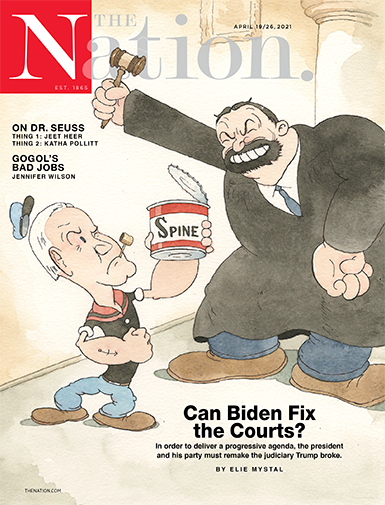President Joe Biden speaks in the Rose Garden of the White House in April 2021. (Andrew Harnik, File / AP Photo)
Subscribe to The Nation
Subscribe now for just $ 2 a month!
Thank you for subscribing to The Nation’s weekly newsletter.
Thanks for signing up. For more information on The Nation, see our latest issue.
Subscribe to The Nation
Subscribe now for just $ 2 a month!
Support progressive journalism
The Nation is Reader Support: Enter at least $ 10 so we can keep writing on the topics that matter most.
Register for our wine club today.
Did you know that by drinking wine you can support The Nation?
Dear President Biden,
You have pledged to fight to rid our nation of systemic racism. I think you mean that. But it seems that many in your administration don’t. Or maybe they just underestimate your determination.
When you announced your plan to rebuild our country’s infrastructure last week, you showed how you can pay for much of the cost through corporate tax hikes. You haven’t gone into the intricate details, but you took the time to research the Cayman Islands and Bermuda to blame for our corporate tax errors. For reasons I understand all too well, you’ve identified the wrong culprits.
In your presentation, you stated that companies in the Caymans and Bermuda had hidden profits. That may be true in a sense. But it also embodied the racism and xenophobia that you promised to remove from our political discourse.
The tax experts you surround yourself with know that Switzerland is at the top of the list of tax havens. The same goes for your beloved Ireland. In her testimony, Kim Clausing, your assistant assistant secretary for tax analysis, carefully noted that you don’t have to look beyond Europe to find four of the “big seven” corporate tax havens (Ireland, Luxembourg, the Netherlands and Switzerland). But your advisors also know that whenever a new blacklist of tax havens is drawn up, these rich, white countries escape inclusion.
After reading this far, you probably understand your mistake. Your predecessor routinely exploited racism, both pointedly and casually, for political gain. And now you know you have too. While I suspect you would like to take responsibility for this, I am not blaming you.
I blame your extraordinary team of tax specialists. When Paul Krugman joked that there weren’t any tax professionals who hadn’t yet joined your administration, I immediately thought of someone they hadn’t even spoken to until a few days ago.
Current topic

With her acclaimed book The Whiteness of Wealth, Dorothy Brown showed the world what we nerds long suspected of taxing. As Brown puts it bluntly, “When white and black Americans are doing exactly the same thing – marriage, home ownership, work, college pay – tax policies favor the white way of acting while penalizing the black way of acting . “While the IRS’s longstanding refusal to compute statistics by race has made hard data scarce, no one knows more about the impact of racism on our tax laws than Brown. The reason your team berated them despite their promises to challenge systemic racism explains why they failed to adequately warn you against using your bullying pulpit to indict a couple of black-majority countries for the failure of our global tax system without mentioning the majority . white Ireland or Switzerland.
They just don’t want to talk about race. Which is a problem. One of your first actions as president was to issue an executive order against systemic racism. For the first time, this will force our country’s tax officials to recognize that tax law can not only reflect white privilege, but can also strengthen it.
While this is an important first step, more needs to be done if you want to avoid divisive tax rhetoric and policy. First of all, I hope that you will reach out to Brown personally to learn more about her ideas. Next, you need to make sure you have experts on your team who specifically focus on race and taxes (seriously, they exist). Most importantly, you tell everyone at the Treasury that you really mean what you say when it comes to systemic racism.
Thanks to the efforts of former representative Charles Rangel, we already know what anti-racist international tax policy looks like. He rejected the idea of punishing tax havens selectively with sanctions. Instead, his law on compliance with the tax regulations for foreign accounts threatened with penalties for banks worldwide – even in Switzerland – that did not identify tax fraud. The fact that the 10 counties in the United States whose residents are screened with the highest rates are predominantly black suggests that there are similar opportunities for anti-racism around here.
Even if you managed to completely defeat racism in all other parts of government, it would be a problem not to tax it. That would be like replacing all of our gas guzzlers with electric cars just to fuel them with coal-fired power plants. You can’t fix systemic racism without carefully looking at the laws that fuel our government – and sometimes learning a harsh truth about them.